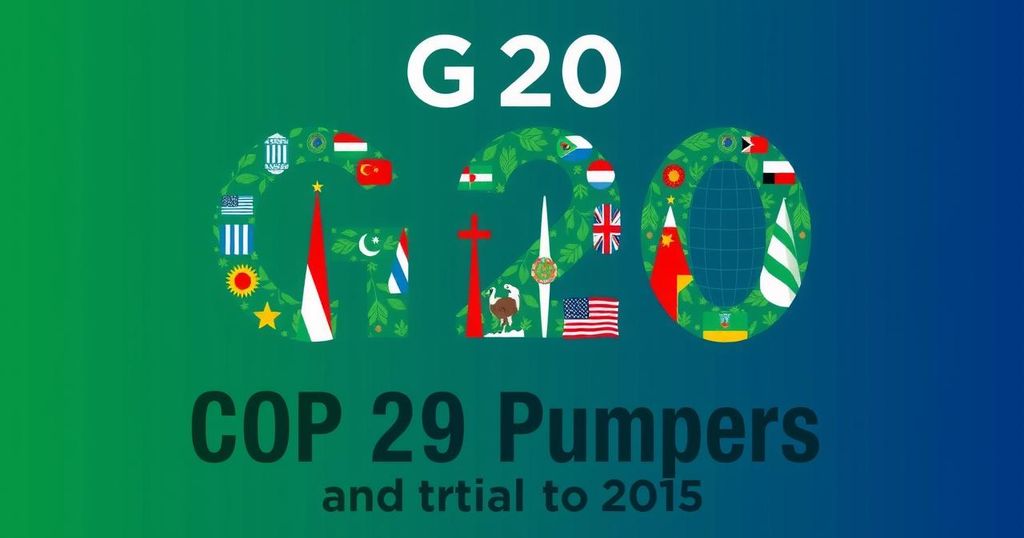Climate change
Global news
Technology
AMAZON, ANTÓNIO GUTERRES, ANTONIO GUTERRES, ASIA, AZERBAIJAN, BAKU, BRAZIL, CLIMATE CHANGE, DUBAI, EUROPEAN UNION, G20, INTERNATIONAL RELATIONS, PARIS AGREEMENT, RIO, SIMON STIELL, SOUTH AMERICA, STIELL, UN, UN NEWS, UNITED ARAB EMIRATES
Isaac Bennett
0 Comments
G20 Leaders Push for Trillions in Climate Finance Ahead of COP29
G20 leaders in Rio have called for a significant increase in climate finance, urging a transition from billions to trillions. As COP29 approaches its conclusion in Baku, negotiations face stagnation amid entrenched national positions. UN officials stress the need for urgent action and collaboration on climate finance, agrifood security, and water resource management, emphasizing their critical importance for sustainable development.
On Tuesday, G20 leaders convening in Rio de Janeiro signaled a decisive shift in the diplomatic focus on climate change. They emphasized the urgency of increasing climate finance, advocating for a transition from billions to trillions in funding from diverse sources. Although the statement refrained from explicitly outlining the need to move away from fossil fuels—an agreement established at COP28 in Dubai—the G20 acknowledged the previous climate talks’ outcomes. With COP29 approaching its conclusion in Baku, tensions persist as negotiations regarding funding for loss and damage and clean energy goals remain stagnant, with countries entrenched in their respective positions. UN climate chief Simon Stiell highlighted the necessity for G20 leaders to drive forward financial reforms to facilitate effective global climate action, amid alarming debt crises and worsening climate conditions worldwide. He stated, “A successful new finance goal… is in every country’s clear interests.” UN Secretary-General António Guterres, participating in sustainable development discussions in Rio, emphasized that failure to reach an agreement in Baku could severely jeopardize COP30’s ambitions set for Brazil next year. He urged cooperation among nations, stating, “Failure [in Baku] is not an option.” As the negotiations evolve, various meetings are addressing critical issues surrounding agriculture and food security. The FAO reported that a significant majority of countries regard agrifood systems as vital for climate change adaptation and mitigation within their Nationally Determined Contributions (NDCs). FAO Assistant Director-General Viorel Gutu noted, “Agrifood systems are key to achieving food security and hold the solutions to multiple challenges.” Nonetheless, he pointed out that inadequate financing hinders necessary transformations. Representatives from UN Women raised concerns regarding women’s roles in agriculture and the challenges they face, emphasizing that systemic support is crucial for women-led initiatives. Meanwhile, the panel discussions at COP29 have spotlighted water-related hazards and their impacts on ecosystems and food security, as highlighted by Sonja Koppel of the UN Water Convention, who encouraged proactive international cooperation on shared water resources. Overall, COP29 provides a critical platform for addressing pressing climate finance issues, agrifood security, and the challenges imposed by water scarcity, with the aim of ensuring that clear actionable paths emerge towards combatting climate change effectively.
The article discusses the recent meetings of G20 leaders in Rio de Janeiro, focusing on their collective commitment to enhancing climate finance in anticipation of COP29. As the climate talks face slow-moving negotiations, the need for a significant funding increase is paramount. The gatherings address vital concerns regarding agriculture, food security, and water management in light of climate change. UN officials emphasize the urgency of effective diplomatic efforts to meet climate targets, particularly as global leaders prepare for future COP sessions.
The G20 leaders’ strong endorsement for increasing climate finance marks a pivotal moment leading into COP29. However, challenges remain in the negotiations amidst varying national positions. The necessity for enhanced support for agrifood systems and water management is clear, as these are essential elements of sustainable development. It is crucial that nations unite to tackle these issues with a sense of urgency to ensure meaningful progress in the fight against climate change as COP29 unfolds.
Original Source: www.eurasiareview.com




Post Comment